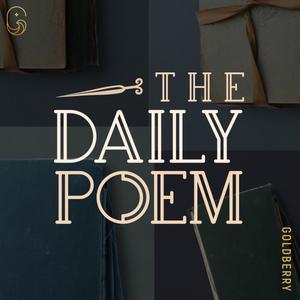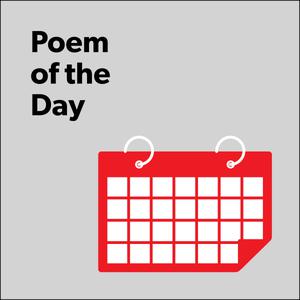
The Daily Poem
David Kern
An audio anthology of the best poetry ever written
- 5 minutes 15 secondsJohn Keble's "The Accession"
Today’s poem, though written for the far more infrequent crowning of monarchs, contains plenty of sentiments fitting for a quadrennial presidential inauguration. Happy reading.
On a pillar on the west wall of Poets' Corner in Westminster Abbey is a white marble bust to poet and clergyman John Keble. The bust is signed and dated by Thomas Woolner, 1872 and is just inscribed 'JOHN KEBLE'. The memorial was originally much more elaborate and was in the south west tower chapel of the nave (now St George's chapel), placed between Dr Thomas Arnold and William Wordsworth. The bust, on a foliated corbel, was set within a decorated oval frame set with jewels with two small pillars either side of the bust. Above was a decorated cross and below a square tablet with the inscription:
In memory of John Keble, author of the Christian Year. Born 1792. Died 1866. In quietness and in confidence shall be your strength. Isaiah xxx.15. He rests in peace at Hursley of which he was Vicar 30 years.
When the chapel was redesigned in 1932 the memorials there were all moved - Arnold to the north west nave chapel and Wordsworth to Poets' Corner. Only the bust of Keble was retained and mounted on a new Purbeck marble bracket in the Corner.
He was born at Fairford in Gloucestershire on 25th April 1792, son of the Reverend John Keble and his wife Sarah (Maule). After education at home he attended Oxford University. In 1827 he published his popular work The Christian Year. He was professor of poetry at Oxford and became rector of Hursley in Hampshire in 1836. With Newman and Pusey he instigated the Oxford Movement. He married Charlotte Clarke but there were no children. He died on 29th March 1866 and is buried at Hursley. Keble College in Oxford was founded in his memory.
-bio via Westminster Abbey
This is a public episode. If you’d like to discuss this with other subscribers or get access to bonus episodes, visit dailypoempod.substack.com/subscribe22 January 2025, 9:24 pm - 10 minutes 14 secondsYvor Winters' "At the San Francisco Airport"
Though not yet the Dantesque hells that they are today, airports in 1954 were already places of union, separation, and general existential anxiety. This meditation comes from a serious and sphinx-like Winters at the height of his poetic development–though not yet at his own “terminal,” here he is a man who already has plenty to look back on. Happy reading.
(Arthur) Yvor Winters was born in Chicago on October 17, 1900. While studying at the University of Chicago he was diagnosed with tuberculosis and decided to relocate to Santa Fe, New Mexico, for the sake of his health. His early poems, published in 1921 and 1922, were all written at a tuberculosis sanitarium. He enrolled at the University of Colorado in 1925, where he earned his bachelor’s and master’s degrees. In 1926, he married the poet and novelist Janet Lewis. He spent two years teaching at the University of Idaho in Moscow before entering Stanford University as a graduate student, receiving his PhD in 1934. From 1928 until his death, he was a member of Stanford’s English department.
Winters’s books of poetry include The Early Poems of Yvor Winters, 1920–1928(Swallow Press, 1966); Collected Poems (1952; revised edition, 1960), winner of the Bollingen Prize; Poems (Gyroscope Press, 1940); Before Disaster (Tryon Pamphlets, 1934); The Proof (Coward-McCann, Inc., 1930); and The Immobile Wind (M. Wheeler, 1921). In Defense of Reason (Swallow Press, 1947), Winters’s major critical work, is a collection of three earlier studies: The Anatomy of Nonsense (New Directions, 1943); Maule’s Curse (New Directions, 1938); and Primitivism and Decadence (Arrow Editions, 1937).
Winters was also a prolific and controversial critic who believed that a work of art should be “an act of moral judgement” and attacked such literary icons as T. S. Eliot and Henry James. The chair of the Stanford English department notoriously denounced Winters as a “disgrace to the department.”
Winters’s honors include a National Institute of Arts and Letters award as well as grants from the Guggenheim Foundation and the National Endowment for the Arts. He died on January 25, 1968, in Palo Alto, California.
-bio via Academy of American Poets
This is a public episode. If you’d like to discuss this with other subscribers or get access to bonus episodes, visit dailypoempod.substack.com/subscribe20 January 2025, 1:38 pm - 6 minutes 25 secondsBilly Collins' "Thesaurus"
If hot takes about synonyms are your cup of tea, favorite, darling, jam, or weapon of choice, then today’s poem is for you. Happy reading.
This is a public episode. If you’d like to discuss this with other subscribers or get access to bonus episodes, visit dailypoempod.substack.com/subscribe17 January 2025, 1:00 pm - 12 minutes 54 secondsJohn Davies' "Nosce Teipsum: of Human Knowledge"
We that acquaint ourselves with every zone,And pass both tropics and behold the poles,When we come home, are to ourselves unknown,And unacquainted still with our own souls.
Today’s poem is Davies’ lengthy meditation on what man can know and what he could stand to learn. Happy reading.
Poet and lawyer Sir John Davies was born in Wiltshire and educated at Winchester College and Queen’s College, Oxford, though historians disagree about whether he graduated. In 1588, he enrolled in the Middle Temple, where he studied with John Donne, and was called to the bar in 1595. In addition to his legal study, Davies wrote poetry, notably Orchestra, or, A Poeme of Dancing (1596). Davies’s other works include a series of epigrams drawn from his youthful misadventures; Nosce teipsum (1594), a poetic treatise on the immortality of the soul; and Hymnes of Astraea in Acrosticke Verse (1599),an acrostic poem spelling the words Elisabetha Regina. Davies also contributed poetic dialogues to Francis Davison’s Poetical Rhapsody(1602). His Collected Poems appeared in 1622. It is thought that Davies accompanied King James to Scotland after Queen Elizabeth’s death in 1603. Eventually knighted by the king, Davies was made solicitor general for Ireland and emerged as a champion of legal reform in Ireland. He attempted to lay the grounds for a strong civil society, albeit one that benefited England and English rule in all cases. Davies helped cement pro-English property laws and advocated the expulsion of Catholic priests to shore up Protestantism. He was appointed speaker in the Irish Parliament in 1613 and presided over the first Protestant majority. He returned to England and served in the Parliament of 1621. Charles I appointed Davies lord chief justice in 1626, but he died just before officially taking office. John Donne gave his funeral oration. Davies was buried in St. Martin-in-the-Fields.
-bio via Poetry Foundation
This is a public episode. If you’d like to discuss this with other subscribers or get access to bonus episodes, visit dailypoempod.substack.com/subscribe15 January 2025, 1:00 pm - 4 minutes 1 secondTed Kooser's Blizzard Voices
Today’s poems are selected from Ted Kooser’s The Blizzard Voices, a collection of informal verse commemorating the apocalyptic Great Plains blizzard of 1888. He mined histories and first-hand accounts to give “voice” to the men and women who lived through the unprecedented storm. Happy reading.
This is a public episode. If you’d like to discuss this with other subscribers or get access to bonus episodes, visit dailypoempod.substack.com/subscribe13 January 2025, 6:25 pm - 4 minutes 35 secondsKingsley Amis' "A Bookshop Idyll"
Today’s poem is a roller-coaster of machismo and vulnerability in that most singular of places–the poetry section of a small bookstore. Happy reading.
Kingsley Amis (1922–1995) was a popular and prolific British novelist, poet, satirist, and critic. Born in suburban South London, the only child of a clerk in the office of the mustard-maker Colman’s, he won an English scholarship to St John’s College, Oxford, where he began a lifelong friendship with fellow student Philip Larkin. Following service in the British Army’s Royal Corps of Signals during World War II, he completed his degree and joined the faculty at the University College of Swansea in Wales. Lucky Jim, his first novel, appeared in 1954 to great acclaim and won a Somerset Maugham Award. Ultimately he published twenty-four novels, including science fiction and a James Bond sequel; more than a dozen collections of poetry, short stories, and literary criticism; restaurant reviews and three books about drinking; political pamphlets and a memoir; and more. Amis received the Booker Prize for his novel The Old Devils in 1986 and was knighted by Queen Elizabeth II in 1990.
-bio via NYRB
This is a public episode. If you’d like to discuss this with other subscribers or get access to bonus episodes, visit dailypoempod.substack.com/subscribe10 January 2025, 1:00 pm - 6 minutes 28 secondsA. E. Stallings' "Scissors"
Today’s poem offers an incisive analogy for analogies. Happy reading.
A.E. (Alicia) Stallings is the Oxford Professor of Poetry. She grew up in Decatur, Georgia, and studied classics at the University of Georgia and Oxford University. Her poetry collections include Like (2018), a finalist for the Pulitzer Prize; Olives (2012), which was nominated for a National Book Critics Circle Award; Hapax (2006); and Archaic Smile(1999), winner of the Richard Wilbur Award and finalist for both the Yale Younger Poets Series and the Walt Whitman Award. Her poems have appeared in The Best American Poetry anthologies of 1994, 2000, 2015, 2016, and 2017, and she is a frequent contributor to Poetry and the Times Literary Supplement.
Stallings’s poetry is known for its ingenuity, wit, and dexterous use of classical allusion and forms to illuminate contemporary life. In interviews, Stallings has spoken about the influence of classical authors on her own work: “The ancients taught me how to sound modern,” she told Forbes magazine. “They showed me that technique was not the enemy of urgency, but the instrument.”
Stallings's latest verse translation is the pseudo-Homeric The Battle Between the Frogs and the Mice (2019), in an illustrated edition with Paul Dry Books, and her latest volume of poetry is a selected poems, This Afterlife (2023, FSG). She is the recipient of fellowships from the Guggenheim Foundation and the MacArthur Foundation. She lives in Athens, Greece, with her husband, the journalist John Psaropoulos.
-bio via Poetry Foundation
This is a public episode. If you’d like to discuss this with other subscribers or get access to bonus episodes, visit dailypoempod.substack.com/subscribe8 January 2025, 9:23 pm - 7 minutes 59 secondsRichard Wilbur's "A Wedding Toast"
Today’s poem draws together marriage and the blessing of water. Happy reading.
This is a public episode. If you’d like to discuss this with other subscribers or get access to bonus episodes, visit dailypoempod.substack.com/subscribe6 January 2025, 9:17 pm - 11 minutes 33 secondsPhilip Appleman's "To the Garbage Collectors in Bloomington, Indiana, the First Pickup of the New Year"
If you can see “a World in a Grain of Sand/And a Heaven in a Wild Flower,” what can you see in the trashcan at the curb? Apparently quite a bit, if you look closely. Today’s poem, a paean to the unsung heroes of the holidays, can help with that.
Also in today’s episode: a look at what’s new for The Daily Poem in 2025.
Happy reading!
Philip Appleman (1926-2020) served in the U.S. Army Air Corps during World War II and in the Merchant Marine after the war. He has degrees from Northwestern University, the University of Michigan, and the University of Lyon, France.
His acclaimed books of poetry include Karma, Dharma, Pudding & Pie (W. W. Norton, 2009), New and Selected Poems, 1956-1996 (1996); Let There Be Light (1991); Darwin's Bestiary (1986); Open Doorways (1976); and Summer Love and Surf (1968). He is also the author of three novels, including Apes and Angels (Putnam, 1989); and six volumes of nonfiction, including the Norton Critical Edition, Darwin (1970).
Appleman has taught at Columbia University, SUNY Purchase, and is currently Distinguished Professor Emeritus at Indiana University, Bloomington. He has also served on the Governing Board of the Poetry Society of America and the Poets Advisory Board of Poets House. His many awards include a Fellowship in Poetry from the National Endowment for the Arts, a Pushcart Prize, and both the Castagnola Award and the Morley Award from the Poetry Society of America.
-bio via Academy of American Poets
This is a public episode. If you’d like to discuss this with other subscribers or get access to bonus episodes, visit dailypoempod.substack.com/subscribe3 January 2025, 8:50 pm - 5 minutes 56 secondsRobert Service's "The Passing of the Year"
Does today’s poem contain the secret to minimizing regret in 2025? Kinda, sorta. Happy reading.
In his youth, Robert Service worked in a shipping office and a bank, and briefly studied literature at the University of Glasgow. Inspired by Rudyard Kipling and Robert Louis Stevenson, Service sailed to western Canada in 1894 to become a cowboy in the Yukon Wilderness. He worked on a ranch and as a bank teller in Vancouver Island six years after the Gold Rush, gleaning material that would inform his poetry for years to come and earn him his reputation as “Bard of the Yukon.” Service traveled widely throughout his life—to Hollywood, Cuba, Alberta, Paris, Louisiana, and elsewhere—and his travels continued to fuel his writing.A prolific writer and poet, Service published numerous collections of poetry during his lifetime, including Songs of a Sourdough or Spell of the Yukon and Other Verses (1907), which went into ten printings its first year, Ballad of a Cheechako (1909) and Ballads of a Bohemian (1921), as well as two autobiographies and six novels. Several of his novels were made into films, and he also appeared as an actor in The Spoilers, a 1942 film with Marlene Dietrich.
-bio via Poetry Foundation
This is a public episode. If you’d like to discuss this with other subscribers or get access to bonus episodes, visit dailypoempod.substack.com/subscribe2 January 2025, 1:26 pm - 8 minutes 17 secondsHelen Hunt Jackson's "New Year's Morning"
Happy New Year (and Happy Reading) from The Daily Poem!
Born in Amherst, Massachusetts, to academic Calvinist parents, poet, author, and Native American rights activist Helen Hunt Jackson (born Helen Maria Fiske) was orphaned as a child and raised by her aunt. Jackson was sent to private schools and formed a lasting childhood friendship with Emily Dickinson. At the age of 21, Jackson married Lieutenant Edward Bissell Hunt and together they had two sons. Jackson began writing poetry only after the early deaths of her husband and both sons.
Jackson published five collections of poetry, including Verses (1870) and Easter Bells (1884), as well as children’s literature and travel books, often using the pseudonyms “H.H.,” “Rip van Winkle,” or “Saxe Holm.” Frequently in poor health, she moved to Colorado on her physician’s recommendation and married William Sharpless Jackson there in 1875.
Moved by an 1879 speech given by Chief Standing Bear, Jackson wrote A Century of Dishonor (1881), an exposé of the rampant crimes against Native Americans, which led to the founding of the Indian Rights Association. In 1884 she published Ramona, a fictionalized account of the plight of Southern California’s dispossessed Mission Indians, inspired by Harriet Beecher Stowe’s Uncle Tom’s Cabin.Jackson was inducted into the Colorado Women’s Hall of Fame in 1985.
-bio via Poetry Foundation
This is a public episode. If you’d like to discuss this with other subscribers or get access to bonus episodes, visit dailypoempod.substack.com/subscribe1 January 2025, 9:23 pm - More Episodes? Get the App
Your feedback is valuable to us. Should you encounter any bugs, glitches, lack of functionality or other problems, please email us on [email protected] or join Moon.FM Telegram Group where you can talk directly to the dev team who are happy to answer any queries.
 Close Reads Podcast
Close Reads Podcast
 The Literary Life Podcast
The Literary Life Podcast
 The Habit
The Habit
 The New Mason Jar with Cindy Rollins
The New Mason Jar with Cindy Rollins
 Audio Poem of the Day
Audio Poem of the Day
 Read-Aloud Revival ®
Read-Aloud Revival ®